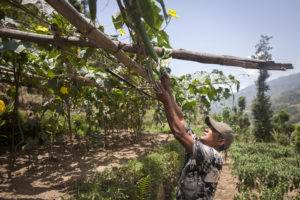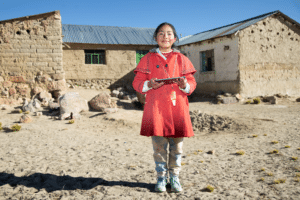Being able to finally travel to Africa to meet our teams here has been both energising and enlightening and given me the space to reflect on the year that has passed and the one that we are rapidly moving through.
Tackling climate change and its impacts
The issues caused by climate change cut across all the work we do; people living in poverty tend to be the most vulnerable to climate change. Farmers around the globe are having to adapt their practices and crops in order to survive, cities are continuing to grow rapidly as people leave rural areas which can no longer provide for them, placing more pressure on services such as waste management, water supplies and sewers. In many cases, these communities are moving from land which is no longer usable due to drought or rising sea levels to housing in areas highly vulnerable to landslides and flooding.
A really positive part of the end of 2021 was Practical Action’s involvement in the Guardian and Observer’s climate justice appeal, which brilliantly raised over £1 million. Following our efforts at COP26 to play our part in trying to ensure the needs of those at the front line of climate change were prioritised, it was a real boost to be part of a strong media campaign highlighting the very real consequences of our failure to address the climate emergency and how to scale up solutions that deliver for those that need them most.
In 2022 we will be putting our share of the money raised to very good use as we have done with previous appeals. We will have two UK Aid Match funded programmes enabling people to access the tools, training and technology they need to regain control of their lives so they can deal with the consequences of the climate crisis operating in the vastly contrasting conditions of Nepal and Darfur, Sudan and a third one drawing to a close in Zimbabwe.

Tek Bahadur Thapa in his vegetable garden, Nepal.
We will use the results to further develop our portfolio of evidence of best practice, working with partners to enable more finance to be allocated for solutions that deliver for those at the frontline of climate change.
Partnerships for Impact
Change at scale requires strategic, innovative and unusual partnerships. Some examples of the ones that we have underway are below and building more of these with the private sector, governments and a range of other partners to accelerate progress to more regenerative, circular and sustainable economies will continue to be a priority in 2022.
- In Bangladesh our partnership with international companies, funders and local community organisations takes a circular economic approach to keeping plastics out of rivers. We are testing out a new business model, supporting waste collectors to recover hard-to-recycle plastics which is then turned into a transport fuel. Our aim is to demonstrate how it could be adapted to other cities with heavily polluted rivers around the world, substantially reducing the amount of plastic reaching oceans and keeping people at the heart of waste management systems.
- Our multi-sector coalition with Zurich Insurance which we have been part of for almost a decade, continues to develop, supporting communities around the world to strengthen the resilience to floods, saving lives, supporting long term livelihoods and influencing the global approach to dealing with a range of climate risk. This year we will continue to expand the partnership to West Africa and broaden its focus to a wider range of climate risks, including in urban areas.
- The Global Distributors Collective (GDC) which supports the private sector and social enterprises to scale up distribution of reliable energy and other essential services to last mile communities. Since its launch at the end of 2018, it has grown to over 200 members operating in over 50 countries reaching over 35 million people. Alongside continued growth in the GDC’s reach, I am looking forward to further developments in its work to support access to investment and finance for last mile companies and improve the policy, regulatory and financial environment to support further reach and impact.
- Our partnership with the IKEA Foundation in Africa aims to demonstrate how regenerative agriculture can revitalise rural economies particularly for young people. In 2022 we will be focusing on building the business case and working with a whole range of partners to scale the move to regenerative food systems which is so important to all our futures. An important component of this work will be building on our 2021 Regenerative Agriculture: Growing Pains series of webinars, increasing our support to companies who want to make the move to more regenerative practices.
- The Brighter Futures renewable energy for schools programme in Peru, which has been recognised for its success in bridging the gap between local authorities, national government and grassroots community leaders to create change at scale – in this case, access to modern energy in schools to help reduce the education-attainment gap between rural and urban students.

A school girl in Peru holds a computer tablet.
HRH Prince of Wales has been a patron of Practical Action since 1980 and we are pleased to be supporting his Terra Carta and Sustainable Markets Initiative. This aims to radically shift business models and generate large-scale investment to build a more sustainable future, accelerating the transition to a world that puts nature, people and planet at the heart of global economies.
Systems Change
Linking approaches that deliver for communities at the sharp end of poverty and the climate crisis with changes in financing, business practice and the policy and regulatory environment, is crucial to achieving the huge changes required for people to adapt to climate change and to prevent it from continuing.
One great example from 2021 was the announcement by the Zimbabwean Government that they were to make an approach to farming we had been supporting and advocating for part of their core agricultural policy. Our work over many years trained farmers in the Pfumvudza practice, implementing long-held knowledge which was in danger of being lost, making the difference between having sufficient food throughout the year and going hungry. By demonstrating the potential of this approach to decision makers at a national level, there is now the potential to change the lives of hundreds of thousands of farmers in Zimbabwe for good.
In Bolivia, we have been combining partnerships with organisations ranging from the private sector to NGOs such as Christian Aid, funding partners such as GIZ and international organisations such as European Union to deliver change for rural communities grappling with new weather patterns. In the past year, more than 2,000 rural families have improved their incomes through accessing modern renewable energy, improving their production and accessing new markets for their businesses, something that was recognised when we were awarded the UN Global Compact Award for SDG 2 (Zero Hunger).
In 2022, we will continue to work to change agriculture, sanitation, waste and energy systems so they work for those most in need, transforming lives and livelihoods. We will build on our influential market systems approaches on renewable energy for displaced people and other last mile communities. We will work with partners to scale up clean cooking, building sustainable markets and linking with climate finance. And we will work with the informal sector, companies and municipal authorities to achieve and scale services for the urban poor.
And in this rapidly changing and uncertain environment, we will continue to be ready to react and adapt to the challenges, good and bad, to improve the world for those vulnerable to climate change and poverty.